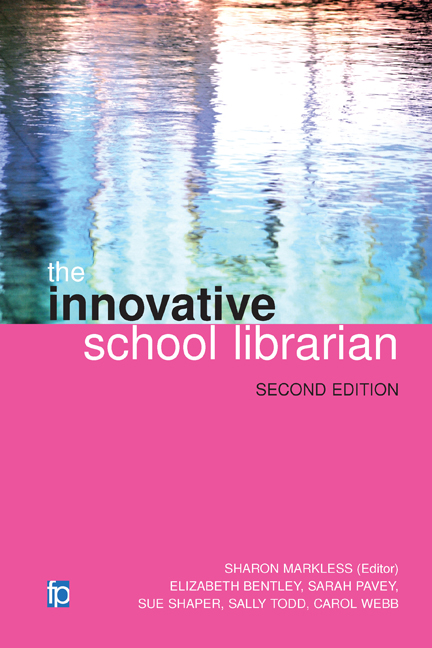Book contents
- Frontmatter
- Contents
- Preface
- Acknowledgements
- PART 1 WHO IS THE LIBRARIAN?
- 1 Professionalism and the school librarian
- 2 How others see us
- 3 Bridging the gap between how we see ourselves and how others see us
- PART 2 YOUR COMMUNITY: FROM PERCEPTIONS TO PRACTICE
- PART 3 MOVING FORWARD
- Appendix 1 Levels of education
- Appendix 2 School library self-evaluation questions
- Appendix 3 An example of a completed self-evaluation summary sheet
- Appendix 4 SWOT analysis
- Appendix 5 Choosing priorities in development planning: sample grid
- Appendix 6 Example of a force field analysis: a tool for managing change
- Appendix 7 Managing change: process and principles
- References
- Index
1 - Professionalism and the school librarian
from PART 1 - WHO IS THE LIBRARIAN?
Published online by Cambridge University Press: 08 June 2018
- Frontmatter
- Contents
- Preface
- Acknowledgements
- PART 1 WHO IS THE LIBRARIAN?
- 1 Professionalism and the school librarian
- 2 How others see us
- 3 Bridging the gap between how we see ourselves and how others see us
- PART 2 YOUR COMMUNITY: FROM PERCEPTIONS TO PRACTICE
- PART 3 MOVING FORWARD
- Appendix 1 Levels of education
- Appendix 2 School library self-evaluation questions
- Appendix 3 An example of a completed self-evaluation summary sheet
- Appendix 4 SWOT analysis
- Appendix 5 Choosing priorities in development planning: sample grid
- Appendix 6 Example of a force field analysis: a tool for managing change
- Appendix 7 Managing change: process and principles
- References
- Index
Summary
Why should professionalism be important to us? This has always been a hotly debated topic, across all sectors of librarianship because of its links to status, conduct and quality of service. In recent years we have been travelling through a global economic downturn, which combined with changes in UK government policy has resulted in a rapidly changing educational environment. In order to negotiate our identity within this context we need to make difficult choices, amid a plethora of changing expectations. This chapter will examine professionalism in the belief that it remains fundamental to our work identities.
How do we develop these identities and how do they link to our practice of librarianship?
When writing eight years ago, it was within the context of campaigning in the UK for statutory recognition of school libraries. Now we write at a time when library services in many sectors are being reduced or closed and so discussion of this issue of professionalism is ever more important. Indeed, many schools around the world are not fortunate enough to have a library and those that exist may not have statutory status or be run by someone with a librarianship qualification which results in provision of uneven quality. They may be run by teachers, teaching assistants, clerical assistants or volunteers who bring to the role a variety of qualifications and experience. The professional organization for librarians in the UK – the Chartered Institute of Library and Information Professionals (CILIP) – has moved towards promoting and implementing a framework of qualifications and accreditation, which covers the whole spectrum of those working in our field. There are different stages available on the same road of continuing professional development: Certification, Chartership and Fellowship (CILIP 2014a). Following this pathway or maintaining our footfall on it through the re-validation process, regardless of our starting point, demonstrates our commitment to professionalism.
If we cannot think about professionalism in terms of qualifications, experience or the promise of statutory status, where does that leave our ideas of professionalism? Traditionally we may view the general characteristics of a professional as altruistic, principled and ethical. Membership of a professional organization usually entails the upholding of a charter that sets out a code of conduct and standards to be maintained.
- Type
- Chapter
- Information
- The Innovative School Librarian , pp. 3 - 22Publisher: FacetPrint publication year: 2016



